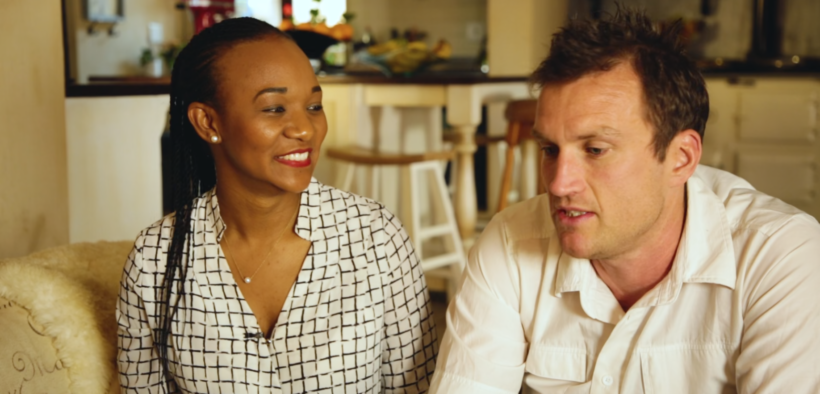Sustainable Service
Neil and Lesego Holsapfel build sustainable South African communities one village at a time

When Neil Holzapfel met Lesego in a New York City coffee shop, he knew almost immediately that he wanted to marry her. He’d asked her there at the prompting of their pastor.
At first glance, the two are very different. Neil is a tall white man. Lesego is a black South African woman with a small frame, but big presence. Neil is an avid investor, a generous financial giver. Lesego is a doer.
What they share is a heart to serve underprivileged people groups. In that first meeting, Neil asked Lesego, “What’s your story?” Her answer almost undid him—God had healed her from the loss of her parents through loving orphans who were just like her.
Together, the couple now lives and serves in South Africa through a nonprofit called Raise the Children and Lesego’s organization Bokamoso Impact Investments. He’s a giver, she’s a doer—together, they are builders.
Lesego knows the pain of being an orphan. Her father died when she was 12, and she felt as though she’d been left out in the cold naked, she said in a video for Generous Giving. Shortly after, she found out her grandmother had died. “I could not contain that pain,” she said. “How could all these things happen in one household at the same time?”
Just as she became a Christian, her mother passed away. “I had just accepted Christ in my life,” she said. She felt angry, confused, and abandoned. But she says God used that season of grief to build her faith and show her “God can use anyone.”
Neil wasn’t an orphan, but he knew what it was to feel alone. “With [my dad], I felt unsafe and unprotected from a very young age,” he said. “I made up my mind to protect myself at 6 years old.” He wanted to prove he could take care of himself.
As he grew and became successful on Wall Street, he also wanted to prove himself by how much he was giving.
During a televised program, Tim Keller said, “the only God who had everything and gave everything to get you was Jesus when He died on the cross,” Neil recalled. “And He did that because He treasures you above all things.” Neil knew well that first part, but had never heard the second. “I was a puddle of tears. I realized, at almost 40 years old, I’d never thought I was worth it.”
He began to see the broken patterns in his life. “Even my generosity flowed from a place of brokenness,” he said. As a consequence, he wasted at least a million dollars giving into projects that weren’t being managed well.
Lesego encouraged him to get his boots on the ground. She went with him to assess the impact and speak with the locals, to get a better grasp of what they were doing with the funds. “It was a lot of money going into this project, but there was little to show for it,” she said.
What they found was that the locals they were supporting were taking advantage of Neil’s generosity and naivete and using the money to their own ends. Lesego told him he was no longer allowed to speak in the meetings. “You’re a pure observer. You don’t know these people, and you don’t know what they want from you,” she told him. “You’re clueless.”
“Suffice it to say, that was the last time I spoke in a meeting,” Neil said, laughing. “I’ve been moved to the board, strategy—stuff I’m actually good at.”
Since then, the couple has shifted their focus, at Lesego’s persistent prodding, from big-city NGOs—Cape Town, Johannesburg, Durban—to the rural villages that few others are willing to venture to. Villages like Manyeledi and Tseoge, where the unemployment rate was 80 percent and school dropouts and teenage pregnancies were common.
“I felt like we were called to reach out to these communities and create opportunities there that are sustainable, where fathers don’t have to come to the cities and look for jobs and leave their families behind,” said Lesego. “If we create opportunities in these communities where mothers and fathers can raise their children together, like it should be, then in that way I feel like it’s a big win.”
Their nonprofit, Raising the Children, works to educate orphans and other vulnerable children in the rural villages.
Lesego also started Bokamoso Impact Investments with the goal to create “opportunities for employment locally that were sustainable and scalable.” They gather 20 students from various villages to go through an entrepreneurship program that includes farming and discipleship. They’re eventually placed in fields of their own to farm and begin hiring other locals.
On Instagram in July, Lesego posed with a group of 10 “emerging cattle farmers” who had trained for months and were receiving cattle, medical support for the animals, infrastructure upgrades, and five years of mentorship. In another post, she holds a bottle of honey from their Bokamoso hives.
Lesego said part of it is casting the vision to the rural Africans they work with, that Africa is the next “break basket” of the world. “Starting with the farmers we incubate, we want them to realize they are the future of Africa,” she said. “Part of our incubation is training them up as disciples and helping Africa rise.”
Neil said their giving is more than “cutting a check” and going on with their lives. “The Kingdom is different from that,” he said. “It’s time, talent, and treasure.”



